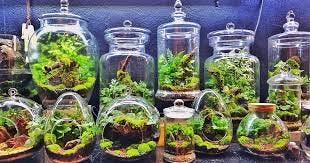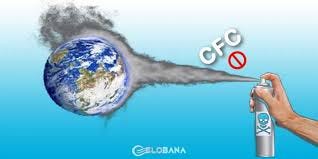IN SEARCH FOR ECOLOGICAL SELF
One day a child asked his father, “Dad, why do you keep birds, ponds, and parks in our home?” “Because I want to return to live with nature, son, so I make the miniature at home,” said the father. “Why is it not in the actual size, Dad?” “That’s because the great nature has been damaged by many humans.”
The dialogue above presents us with how compassionate humans want to return to nature, but they cannot because the great nature has been corrupted. In fact, even the small ‘fake’ nature in the house was entertaining. But the little nature was only eyesight and ear hearing enhancer. Small nature is not very able to provide water absorption and release oxygen like the big nature. It also does not provide biodiversity so that many lives are helped by the great nature. And other various arguments. The problem of natural destruction is not just a problem for some people. It has become a global human problem.


Global Issues
In general, what is becoming a global concern today is: (1) industrialization that is rapidly developing; (2) rapid population growth; (3) the spread of malnutrition; (4) lack of non-renewable natural resources; and (5) deteriorating environmental conditions. And all that can be connected to each other into a big problem of humanity.
Nature can indeed be damaged and we can be affected by the damage. But, is the destruction of nature really from nature itself, or do we damage it? Natural disasters such as earthquakes, volcanoes, tsunamis, etc. are often pointed out as something that cannot be avoided. But pollution (whether water, air, or soil) is caused by human hands. Excessive use of soil leads to erosion and failure of food production. Resources are dwindling because they are continually being used by the world’s affluent population; while the harvest failed a lot. From there food production decreases and mortality rates increase. Similarly, global warming. All are the result of our, humanity, hands.
However, the question then arises, “To what extent is this natural force to accommodate our greed?” Then came out the voices shouting that we must limit ourselves for the continuity of our lives because if not, we will be ‘swallowed’ by our carelessness. This voice is then defined as ‘sustainable society.’


Sustainable Community
The idea of a sustainable society requires us to change the way we treat nature. Ecologists argue that caring for the environment demands radical changes in our relationship with nature. What was voiced, then, was that in order to lead a sustainable society, two things needed to be considered: (1) consumption of material goods by the people, especially by ‘advanced industrial countries’ must be reduced, and (2) human needs cannot be satisfied by the continued growth of the economy as we understand it today.
Continuous and growth unlimited is impossible. Also, that consumption at ever-increasing levels is not possible because of the limited productive limits of the Earth itself.
Reducing consumption means making people less materialistic. Here we need to differentiate between what we really need and which are only wants. But in reality, what we want to ‘change’ to what we need is due to strong persuasive forces, for example by noisy advertisements in various media.
The Earth itself has limited capacity (for residents), limited productive capacity (for sources of all kinds), and limited absorbing capacity (pollution).
Our Needs in Nature
There are two arguments why we should care about the environment: first, because we need that environment; secondly, because nature itself has the right to be sustainable.
We do need forests, for example. Because the forest gives us oxygen, treatment materials, and also prevents landslides. Or, more broadly, we must preserve the nature because it: (1) is a provider of genetic diversity for agriculture, medicine, and other purposes; (2) as material for scientific activities; (3) for recreation; and (4) for the enjoyment of beauty and spiritual inspiration.
We also learn from nature philosophically. For example, from natural diversity we learn to be tolerant, to have stability, and to grow democracy; from interdependence gives rise to an attitude of equality; from survival gives rise to the love of tradition, and from the assumption that nature is a ‘mother’ will give rise to gender awareness.
Therefore, we must live ‘within the environment,’ and not against the environment.


Ecological Education
Ecological awareness needs to be instilled early on. Children must know what they are going to do with the environment. Garbage must be thrown into its place, must save energy, must be able to reuse what is usually already thrown (recycle), love animals, respect biodiversity, and others are attitudes that must be taught to the children. So that the attitudes of life are attached to them so that when they grow up they will be able to distinguish what is good or right is done for nature and what is bad, wrong, and destructive for that nature.
Ecological education must be carried out in various domains of the existence of children. At home, his family must teach and condition ecological ways of life. Leave sprayed items (insect repellent, air freshener, perfume, etc.), for example, because they contain Chlorofluorocarbons (CFCs). Teaches environmental awareness when watching the news or TV shows. At school, students must always be taught and conditioned to be environmentally conscious, both through curriculum and co-curriculum; in the classroom and the outside. For example, environmental awareness is taught when teaching science, social studies, or geography. In extra-curricular, caring for the environment is instilled during exploration events in Scouts, for example. And in other various occasions.
But ecological education is not only for children or students. This education must be given to everyone and lasts throughout life, given the need to constantly remind the meaning of ecology for humans. With various media, regulations, and even punishment humans can be educated into civilized beings. Likewise, awareness of the need to conserve nature. Various campaigns (on TV, radio, billboards, etc.), enforcement of conservation rules (at the parliament or government level), and law enforcement (punishment of those who commit illegal logging and those who pollute the environment, etc.) must continue. Because it is only with continuous awareness that humans have no time to be careless and become corrupted.
So, as a whole, a dignified human being is becoming an ecological human being. Dignified because ecological humans are people who look far ahead, towards the fate of the next generation, who are also entitled to a good nature, which can make them live naturally, like the previous generation. The self is also dignified because ecological humans are those who fight for the fate of their fellow human beings around them. Dignified also because ecological humans are people who respect nature, just like respect himself, because he is also nature.













